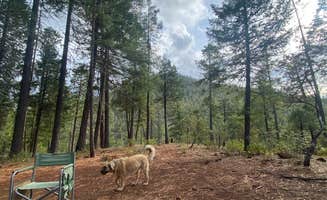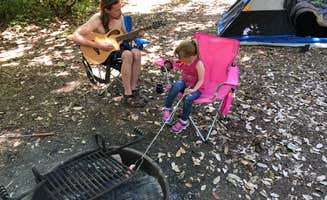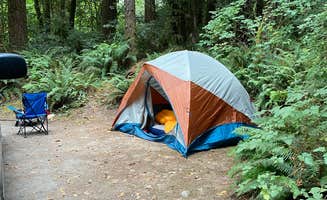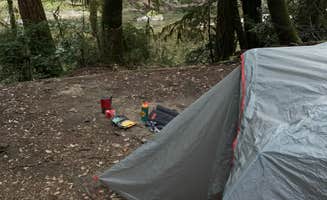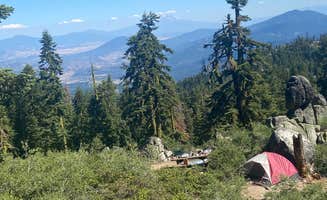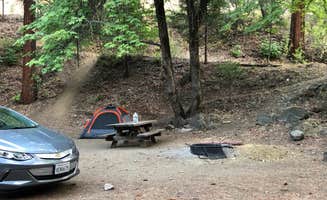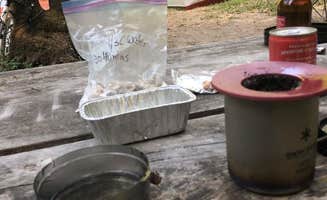Tent campsites near Wilderville, Oregon sit on the western edge of the Rogue River-Siskiyou National Forest at elevations ranging from 1,000 to 4,000 feet. The region features a Mediterranean climate with hot, dry summers and cool, wet winters. Most primitive camping areas require vehicles with good ground clearance as access roads often feature loose gravel and occasional washouts.
What to do
Stargazing at higher elevations: Onion Mountain Lookout offers exceptional night sky viewing from its 4,000-foot elevation. "You are at 4000 feet and you can see the milky way clearly," notes visitor Kevin T., who recommends the location despite the $40 campsite fee.
Swimming in natural water features: Several campgrounds provide river access for cooling off during summer months. At Cedar Bloom, campers have access to "2 areas with river access, a shallow area and a deep swimming hole, with the option to float down some mild (and fun!) rapids," according to Nenah B.
Fishing opportunities: Spalding Pond Campground features stocked trout and native catfish. The pond receives annual fish stocking, providing reliable fishing opportunities from spring through fall, especially for families with children.
What campers like
Natural bathing facilities: Primitive shower setups with river views create memorable experiences. At Cedar Bloom, "There are 2 shower houses, one which has an incredible view of the river. The shower water was hot and refreshing, it felt so special to know the water came directly from the river," writes Nenah B.
Complete seclusion: Tin Can campground offers genuine solitude beside a year-round creek. According to Shannon W., "You will most likely have the whole place to yourself. Beautiful hiking trails throughout the area. We like to camp here especially in the snow!"
Non-motorized lake activities: Squaw Lakes features clear water with unique mineral characteristics. "The water has the most beautiful silver shale sparkles, and almost always feels warm," reports Jennifer A., who notes that only non-motorized boating is permitted.
What you should know
Pack-in/pack-out requirements: Most primitive sites have no trash service. At Squaw Lakes, campers can "hire the camp host and his four-wheeler to drop your gear off at your site. You'll have to walk in," advises Jennifer A.
Limited water availability: Bring sufficient water or filtration equipment. At Spalding Pond Campground, "there is no drinking water available, so you will need to bring your own or plan on filtering/boiling," warns Zak H.
Challenging access roads: Roads to remote sites often require appropriate vehicles. For Josephine Campground, "It is steep, requires 4X4 with high clearance and is not level," notes Bill T., who describes intermittent one-bar Verizon service in the area.
Tips for camping with families
Fenced swimming areas: Look for protected swimming spots for children. At Cedar Bloom, one visitor noted, "Great for kids with a river on site nearby. One part of the river is designated as a nudist-friendly beach but is well-marked."
Fishing-focused sites: Spalding Pond offers accessible fishing for young anglers. With five camping spots, each featuring their own picnic table and fire pit with metal grate, families can enjoy stocked trout fishing without extensive hiking.
Consider hiking distances: Little Falls Campground requires walking gear from parking areas to campsites. "There were 3 tents and 2 cars at the campground so we had to sleep at the parking lot," reports Liliána S., highlighting the limited capacity.
Tips from RVers
Size limitations on forest roads: Many campgrounds near Wilderville have difficult access for larger vehicles. At Cave Creek Campground, "Despite its close location to the Caves, it is extremely hard to take any type of RV there. The road is paved, but Extremely Narrow with limited visibility," explains Kelli B.
Alternative accommodations: Some sites offer unique options beyond traditional RV parking. Cedar Bloom features tent sites alongside cabins and glamping options with composting toilets and community kitchen facilities.
Forest gate access: Some roads have seasonal closures affecting vehicle access. During spring months, forest roads may be gated with special botanical interest areas restricting vehicle traffic, particularly on eastern (uphill) sides of roads.


